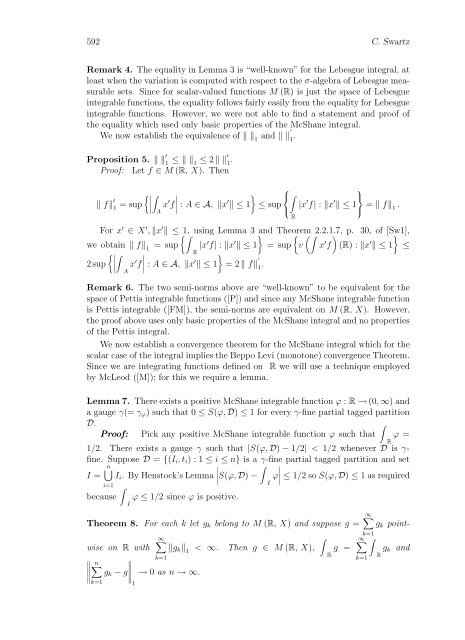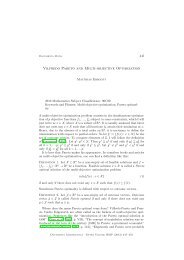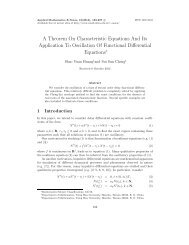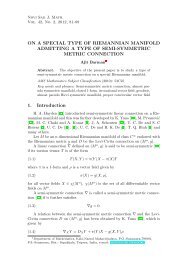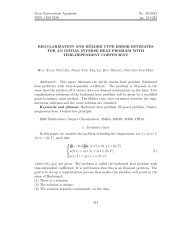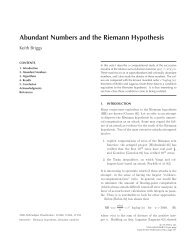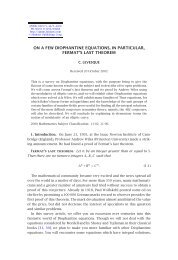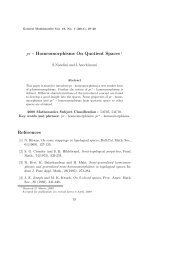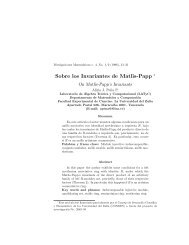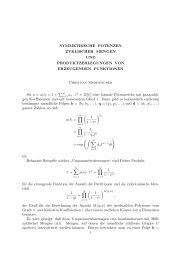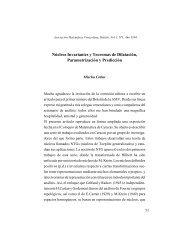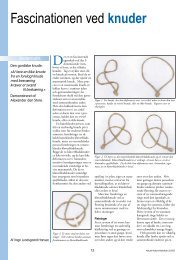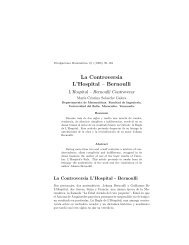Beppo Levi's Theorem for the Vector-Valued McShane Integral and ...
Beppo Levi's Theorem for the Vector-Valued McShane Integral and ...
Beppo Levi's Theorem for the Vector-Valued McShane Integral and ...
Create successful ePaper yourself
Turn your PDF publications into a flip-book with our unique Google optimized e-Paper software.
592 C. Swartz<br />
Remark 4. The equality in Lemma 3 is “well-known” <strong>for</strong> <strong>the</strong> Lebesgue integral, at<br />
least when <strong>the</strong> variation is computed with respect to <strong>the</strong> σ-algebra of Lebesgue measurable<br />
sets. Since <strong>for</strong> scalar-valued functions M (R) is just <strong>the</strong> space of Lebesgue<br />
integrable functions, <strong>the</strong> equality follows fairly easily from <strong>the</strong> equality <strong>for</strong> Lebesgue<br />
integrable functions. However, we were not able to find a statement <strong>and</strong> proof of<br />
<strong>the</strong> equality which used only basic properties of <strong>the</strong> <strong>McShane</strong> integral.<br />
We now establish <strong>the</strong> equivalence of ‖‖ 1<br />
<strong>and</strong> ‖‖ ′ 1 .<br />
Proposition 5. ‖‖ ′ 1 ≤‖‖ 1 ≤ 2 ‖‖′ 1 .<br />
Proof: Let f ∈ M (R, X). Then<br />
‖ f‖ ′ 1 =sup {∣ ∣∣∣<br />
∫<br />
A<br />
⎧<br />
⎫<br />
}<br />
x ′ ⎨∫<br />
⎬<br />
f<br />
∣ : A ∈A, ‖x ′ ‖≤1 ≤ sup |x ′ f| : ‖x ′ ‖≤1<br />
⎩<br />
⎭ = ‖ f‖ 1 .<br />
For x ′ ∈ X ′ , ‖x ′ ‖≤1, {∫<br />
using Lemma 3 } <strong>and</strong> <strong>Theorem</strong> { (∫<br />
2.2.1.7, ) p. 30, of [Sw1], }<br />
we obtain ‖ f‖ 1<br />
=sup |x ′ f| : ‖x ′ ‖≤1 =sup v x ′ f (R) :‖x ′ ‖≤1 ≤<br />
{∣∫<br />
R }<br />
∣∣∣<br />
2sup x ′ f<br />
∣ : A ∈A, ‖x ′ ‖≤1 =2‖ f‖ ′ 1 .<br />
A<br />
Remark 6. The two semi-norms above are “well-known” to be equivalent <strong>for</strong> <strong>the</strong><br />
space of Pettis integrable functions ([P]) <strong>and</strong> since any <strong>McShane</strong> integrable function<br />
is Pettis integrable ([FM]), <strong>the</strong> semi-norms are equivalent on M (R, X). However,<br />
<strong>the</strong> proof above uses only basic properties of <strong>the</strong> <strong>McShane</strong> integral <strong>and</strong> no properties<br />
of <strong>the</strong> Pettis integral.<br />
We now establish a convergence <strong>the</strong>orem <strong>for</strong> <strong>the</strong> <strong>McShane</strong> integral which <strong>for</strong> <strong>the</strong><br />
scalar case of <strong>the</strong> integral implies <strong>the</strong> <strong>Beppo</strong> Levi (monotone) convergence <strong>Theorem</strong>.<br />
Since we are integrating functions defined on R we will use a technique employed<br />
by McLeod ([M]); <strong>for</strong> this we require a lemma.<br />
Lemma 7. There exists a positive <strong>McShane</strong> integrable function ϕ : R → (0, ∞) <strong>and</strong><br />
a gauge γ(= γ ϕ ) such that 0 ≤ S(ϕ, D) ≤ 1 <strong>for</strong> every γ-fine partial tagged partition<br />
D.<br />
∫<br />
Proof: Pick any positive <strong>McShane</strong> integrable function ϕ such that ϕ =<br />
R<br />
1/2. There exists a gauge γ such that |S(ϕ, D) − 1/2| < 1/2 whenever D is γ-<br />
fine. Suppose D = {(I i ,t i ):1≤ i ≤ n} is a γ-fine partial tagged partition <strong>and</strong> set<br />
n⋃<br />
∫<br />
I = I i . By Henstock’s Lemma ∣<br />
∣S(ϕ, D) − ϕ<br />
∣ ≤ 1/2 soS(ϕ, D) ≤ 1asrequired<br />
i=1<br />
I<br />
∫<br />
because ϕ ≤ 1/2 sinceϕ is positive.<br />
I<br />
∞∑<br />
<strong>Theorem</strong> 8. For each k let g k belong to M (R, X) <strong>and</strong> suppose g = g k pointwise<br />
on R with ‖g k ‖ 1<br />
k=1<br />
∞∑<br />
∫<br />
∞∑<br />
∫<br />
< ∞. Then g ∈ M (R, X), g = g k <strong>and</strong><br />
k=1<br />
R<br />
k=1<br />
R<br />
n∑<br />
g<br />
∥ k − g<br />
→ 0 as n →∞.<br />
∥<br />
k=1 1<br />
R


